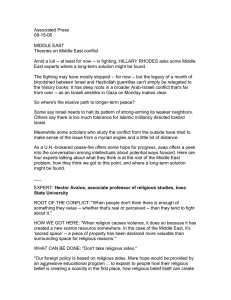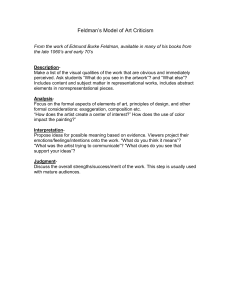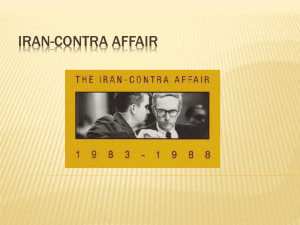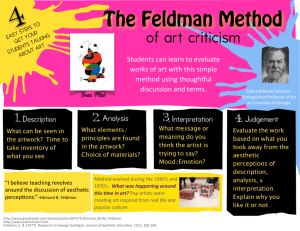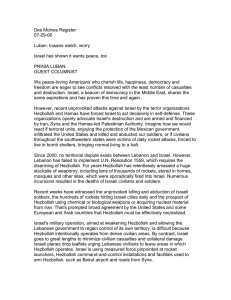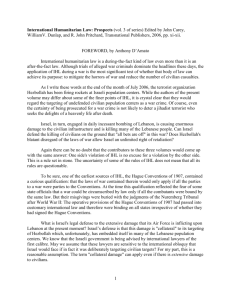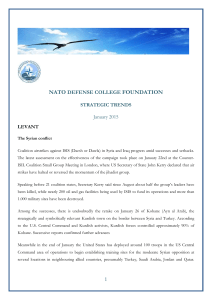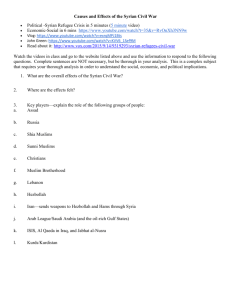Document 11102933
advertisement
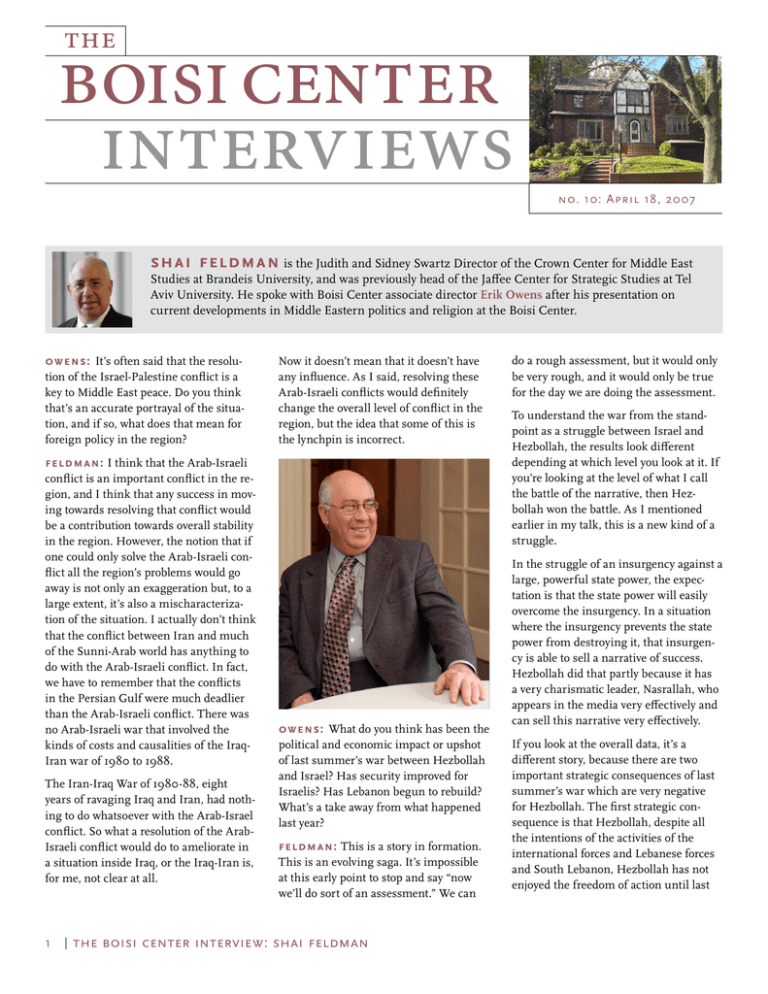
the boisi center interviews no. 10: April 18, 20 07 shai feldman is the Judith and Sidney Swartz Director of the Crown Center for Middle East Studies at Brandeis University, and was previously head of the Jaffee Center for Strategic Studies at Tel Aviv University. He spoke with Boisi Center associate director Erik Owens after his presentation on current developments in Middle Eastern politics and religion at the Boisi Center. owens: It’s often said that the resolution of the Israel-Palestine conflict is a key to Middle East peace. Do you think that’s an accurate portrayal of the situation, and if so, what does that mean for foreign policy in the region? feldman: I think that the Arab-Israeli conflict is an important conflict in the region, and I think that any success in moving towards resolving that conflict would be a contribution towards overall stability in the region. However, the notion that if one could only solve the Arab-Israeli conflict all the region’s problems would go away is not only an exaggeration but, to a large extent, it’s also a mischaracterization of the situation. I actually don’t think that the conflict between Iran and much of the Sunni-Arab world has anything to do with the Arab-Israeli conflict. In fact, we have to remember that the conflicts in the Persian Gulf were much deadlier than the Arab-Israeli conflict. There was no Arab-Israeli war that involved the kinds of costs and causalities of the IraqIran war of 1980 to 1988. The Iran-Iraq War of 1980-88, eight years of ravaging Iraq and Iran, had nothing to do whatsoever with the Arab-Israel conflict. So what a resolution of the ArabIsraeli conflict would do to ameliorate in a situation inside Iraq, or the Iraq-Iran is, for me, not clear at all. 1 Now it doesn’t mean that it doesn’t have any influence. As I said, resolving these Arab-Israeli conflicts would definitely change the overall level of conflict in the region, but the idea that some of this is the lynchpin is incorrect. owens: What do you think has been the political and economic impact or upshot of last summer’s war between Hezbollah and Israel? Has security improved for Israelis? Has Lebanon begun to rebuild? What’s a take away from what happened last year? feldman: This is a story in formation. This is an evolving saga. It’s impossible at this early point to stop and say “now we’ll do sort of an assessment.” We can the boisi center interview: shai feldman do a rough assessment, but it would only be very rough, and it would only be true for the day we are doing the assessment. To understand the war from the standpoint as a struggle between Israel and Hezbollah, the results look different depending at which level you look at it. If you’re looking at the level of what I call the battle of the narrative, then Hezbollah won the battle. As I mentioned earlier in my talk, this is a new kind of a struggle. In the struggle of an insurgency against a large, powerful state power, the expectation is that the state power will easily overcome the insurgency. In a situation where the insurgency prevents the state power from destroying it, that insurgency is able to sell a narrative of success. Hezbollah did that partly because it has a very charismatic leader, Nasrallah, who appears in the media very effectively and can sell this narrative very effectively. If you look at the overall data, it’s a different story, because there are two important strategic consequences of last summer’s war which are very negative for Hezbollah. The first strategic consequence is that Hezbollah, despite all the intentions of the activities of the international forces and Lebanese forces and South Lebanon, Hezbollah has not enjoyed the freedom of action until last summer. You have an international force with all its problems. And for the first time in thirty years, the Lebanese army is reasserting Lebanese sovereignty all the way to the border. So, that’s a major situation that has changed compared to what it was before. Another reason is that the Sunni Arab countries are also fearful. The number one fear, of course, is that Iran will become nuclear and this essentially Shia religious, sharia state will all of a sudden enjoy the aura of a success story, as somebody who defied the west. The second strategic consequence is that with all the limits—the difficulties and setbacks—the Israeli defense forces did succeed in one very important realm. It succeeded in destroying a very, very large chunk of the long-range Iranian-deployed missiles to Hezbollah. And by the way, originally, these missiles were not only Iranian supplied. They were actually originally in the hands of revolutionary guards, a few hundred revolutionary guards who were stationed in Iran and in the Sudan. And gradually the control over these missiles and rockets was transferred to Hezbollah. But this force was a major component of the strategic deterrents against Israel. Partly for the Hezbollah strategic deterrents, and partly for the Iranian strategic deterrents, against what was the possibility that Israel or the combination of Israel and the US, would do something against Iran’s nuclear installations. They’re also concerned, at the same time, that Israel and the US will act militarily against these facilities because that would create a problem for them at the level of public opinion. The leaderships Well, this is a very important arm which has been largely damaged. So when you look at the same conflict, there’s a difference whether you look at it from the standpoint of a narrative, or when you look at it from the actual damage. owens: That’s an important distinction. It’s been reported recently that most Sunni Arab governments in the Middle East and North Africa are vehemently, if quietly, opposed to the nuclear ambitions in Iran, worrying that they’ll have to weaponize their own nations to protect themselves in some way. What implications do you think this will have for ongoing negotiations with Iran and the rest of the world to the UN, the EU? feldman: Well, it depends on what kind of profile those Sunni Arab countries will choose to adopt to pursue this. 2 “Def iance is ver y popular, it’s a ver y populist view to take. It’s popular in Venezuela where Hugo Chavez is, and it’s popular in some quar ters when Ahmadinejad takes the western world on.” are the ones that look at this with great worry. To Iran’s population in the region, neither the United States nor Israel are very popular right now. So any exercise of military, raw military muscle would be a problem for these governments. So, they’re seriously, seriously concerned, but again, partly because of this public opinion. See, defiance is very popular, it’s a very populist view to take. It’s popular in Venezuela where Hugo Chavez is, and it’s popular in some quarters when Ahmadinejad takes the western world on. the boisi center interview: shai feldman So the issue, of course, here is to what extent would the leadership feel that they are strong enough to take a public stand? It’s again an evolving story, we’ll have to follow it. owens: Iraq is clearly in dire straits these days, and there’s no easy or obvious solutions. The escalating violence, what do you think the United States should do in the coming year? feldman: On this issue I’d like to pass because this is one issue where American lives are directly at stake. And I try to avoid giving advice. It’s very easy to be irresponsible in giving advice. But this is really a very, very serious matter, and as I said, it involves American lives directly. In terms of assessing the situation, I can assess the situation. But I don’t think it would be responsible on my part to give advice to the US as to what it should do with Iraq. owens: That’s fair enough. You mentioned in your talk today that democratization as an avenue to peace thesis has been proven unworkable in the current environment. Do you think that this signals a fundamental loss of an orientation in American policy or is it more of a shift to a different kind of moral approach in foreign policy? feldman: No, I think that this ratio between a value driven policy and what people regard as realpolitik, I think the shift is going back towards realpolitik. It doesn’t mean it’s completely abandoned its values. But I think that the kind of a speech that Secretary of State Rice gave a year and a half ago in Cairo, in which she made the commitment to democratizing the Middle East a central pillar of US policy in the region, well, I can’t imagine her giving the same speech now. owens: Does this relate primarily to the problems Iraq has faced? Or North Africa and worries – feldman: No, it’s all over. It’s the issue of, “we push something and what do we get?” We got Islamic brothers stronger than ever. We got Hamas in government in Palestine. We got Hezbollah in government in Lebanon and so on. There is a saying in Hebrew, the translation of which is something like, “it’s not for this baby that we yearn.” owens: One last question and I’ll let you go. Brandeis, where you teach, has found itself at the center of this discussion recently about whether and how Americans can criticize Israel, Israel’s policies, without also somehow criticizing the existing or Israel itself. There have been charges of anti-Semitism. Do you think that that discussion about this is a productive one? Is it a discussion that can lead to positive ends, or is it something that is best left off the table? Is there any way, do you think, to diffuse some of the heated tensions that have arisen amidst this conversation? feldman: If we thought that it was best left off the table we wouldn’t be doing what we’re doing. We are the Crown Center for Middle East Studies, and we are studying the Middle East. We are undeterred in studying the Middle East. We’re also undeterred in our very particular commitment and very particular approach. And the particular commitment and the particular approach is the commitment to what I call balanced and dispassionate study of the region. That means that we have involved with us senior Palestinians. This year we have a senior Palestinian economist, Dr. Mohammed Samhouri. We have probably the number one Egyptian strategic thinker, and we have a person like myself, an Israeli. We are exposing competing theories, competing explanations, what can be referred to as competing narratives about the region, and about the region’s development. That’s our approach. Now, of course, this is challenged not from one direction, it’s challenged from both directions. It’s challenged from the right, and it’s challenged from the left. It’s challenged by people who are 3 driven by passions rather than by the commitment to a dispassionate approach to the region. And it’s clearly driven by people who don’t believe in Hezbollah’s approach. By the way, I specifically use the term balanced, rather than objective. I don’t know what objective means. But I think you can be balanced in the sense that you can provide a stage and attribute equal significance to alternative explanations and alternative approaches and theories. But of course for people who are imbalanced and driven by passions, the balanced and dispassionate approach is a threat to them. Whether they’re from the right or from the left, it really doesn’t matter. And indeed we have been challenged, and the challenge is to the ability to conduct a balanced and dispassionate discourse at Brandeis. The fact has been challenged by both the right and the left. The right has attacked us for our association with a controversial academic, who I think is one of the most enlightened scholars in the region. In a direct way we’re also attacked by the left by constantly charging us by essentially provoking a different kind of debate bypeople who are by definition controversial. When the attempt is to create a controversy, it’s a different commitment. Our commitment is to conduct an exploration, is to try to understand what’s going on. Their commitment is trying to provoke a discussion. So, it’s very different approach, and as I stressed, this approach of ours is challenged by both the right and the left. I also have to say at the same time, that it’s not been only the problem with the concept. It’s been a problem with the university at large. But as far as process is concerned, we are able to hold on to our commitment, and our line, but in very large measure because we have a full and total unyielding support of the President and senior leadership of the university. So, without that we wouldn’t have been able to do it at all. [end] The Boisi Center for Religion and American Public Life Boston College 2 4 Quinc y Road Chestnut Hill, MA 02 467 tel 617 - 55 2-1860 f a x 617 - 55 2-1863 publife@b c .e du Visit bc .e du/boisi-resources for a complete set of the Boisi Center Inter views and audio, video, photographs, and transcripts from our events. the boisi center interview: shai feldman b oisicenter @b oisi _ center
